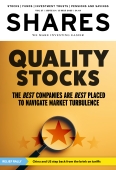Archived article
Please note that tax, investment, pension and ISA rules can change and the information and any views contained in this article may now be inaccurate.
Pharma stocks face volatility on US plan to reduce drug prices

As tariff fears ease elsewhere, the pharmaceutical sector now finds itself in the crosshairs thanks to an executive order trailed by president Donald Trump on 11 May.
The administration apparently mandated a reduction in prescription drug prices of between a third and 80% to give the US ‘most favoured nation’ pricing.
This put global pharma stocks on the back foot, although the vagueness of the language and a slightly weaker than expected tone when the order was published on 12 May saw drug company shares claw back some of the damage.
Analysts at RBC Capital Markets described the executive order as being ‘all bark, little bite’, with limited specifics on how the policy would be implemented.
The order instructs health and human services secretary Robert F Kennedy Jr to communicate and enforce targets to bring down the price of drugs in the US.
The so-called ‘most favoured nation’ benchmarks are meant to match the costs for Americans to the lowest in comparably-developed countries but these prices have not been explicitly outlined.
The sanction for drugmakers not reducing prices include trade penalties against uncooperative nations and potentially the revocation of previous drug approvals.
This is not the only disruption the sector is facing thanks to the policies adopted by the new administration.
Alongside first-half results from biotech-focused investment trust International Biotechnology Trust (IBT), chair Kate Cornish-Bowden observed: ‘The new US health secretary has recently announced plans to reduce the number of employees at the Food and Drug Administration (FDA) by 25% which includes many eminent scientists. This is likely to impact the pace of drug reviews and approval timelines for innovative new treatments.’
This helps explain why the health care sector struggled to demonstrate its usual defensive qualities through the recent market volatility and has been left behind by broader stock market indices in the recovery which followed.
The sector is also acting as a drag on the FTSE 100 as a whole given the material weightings of AstraZeneca (AZN) and GSK (GSK) in the index.
Shares in Novo Nordisk (NOVO-B:CPH), which were caught up in the selling, were also impacted by new evidence that US counterpart Eli Lilly’s (LLY:NYSE) obesity drug Zepbound was superior to Novo’s Wegovy across five weight-loss targets such as reduced waist circumference.
The head-to-head trial comparing the two leading weight loss treatments showed Zepbound helped nearly a quarter of patients lose more than 15% of their body weight compared with Wegovy.
This follows data released in December 2024 from a comparison study which showed Lilly’s drug induced greater weight loss.
Important information:
These articles are provided by Shares magazine which is published by AJ Bell Media, a part of AJ Bell. Shares is not written by AJ Bell.
Shares is provided for your general information and use and is not a personal recommendation to invest. It is not intended to be relied upon by you in making or not making any investment decisions. The investments referred to in these articles will not be suitable for all investors. If in doubt please seek appropriate independent financial advice.
Investors acting on the information in these articles do so at their own risk and AJ Bell Media and its staff do not accept liability for losses suffered by investors as a result of their investment decisions.
Issue contents
Education
Exchange-Traded Funds
Feature
Great Ideas
News
- Why shares in sofa seller DFS Furniture are springing back
- Raft of bad news sends Mobico shares 62% lower year-to-date
- UK consumer confidence falls as unemployment begins to rise
- Markets enjoy relief rally as China and US step back from brink of all-out trade war
- Pharma stocks face volatility on US plan to reduce drug prices
 magazine
magazine








